Event recording and highlights from Equipping the Public Sector for Sustainability Action: Advancing transparency, comparability, and accountability through public sector sustainability reporting
Progressing sustainable development goals, including those related to climate change, requires urgent public sector action. Yet, as of now, no internationally recognized public sector reporting framework exists to help governments measure and report how they are addressing the global climate emergency and other sustainability challenges. With its public sector standard setting expertise and with the support of the international community, the International Public Sector Accounting Standards Board (IPSASB) is looking into how it might change that.
To raise awareness on IPSASB's next steps to advance public sector sustainability reporting and engage global stakeholders, IPSASB, IFAC and Accountancy Europe hosted a well-attended hybrid event in Brussels which discussed the key ideas the IPSASB is exploring. The event was also a discussion about the resources necessary to deliver the urgently needed public sector reporting guidance. In addition to the 100+ participants in the room, the event also attracted over 700 virtual registrants across more than 130 jurisdictions.
Take in our highlights of the event below and watch the full recording to dive deeper into the discussion.
Image
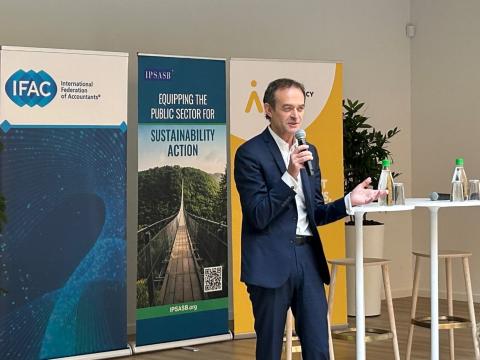
Olivier Boutellis-Taft, CEO of Accountancy Europe opened with a reminder to the participants: “There will be no sustainability transition without the public sector taking the lead.” His remarks set the tone for the event.
Image
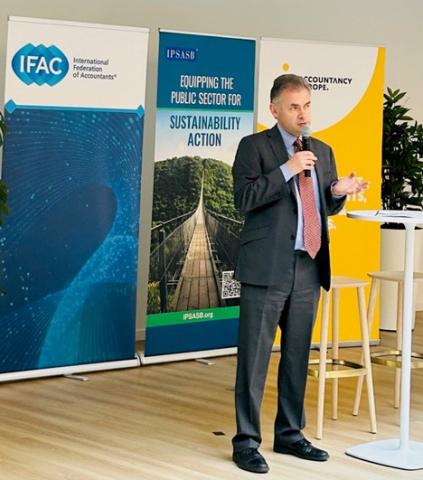
Ian Carruthers, Chair of the IPSASB, presented the main features of IPSASB’s sustainability reporting project. He noted: “The feedback we’ve received from stakeholders around the world is clear: the public sector needs its own specific sustainability reporting framework and the IPSASB should lead its development. The IPSASB has now developed a framework to guide this first critical phase of research and scoping.” Using the infographic below, Carruthers explained the framework used to scope public sector sustainability reporting.
Image
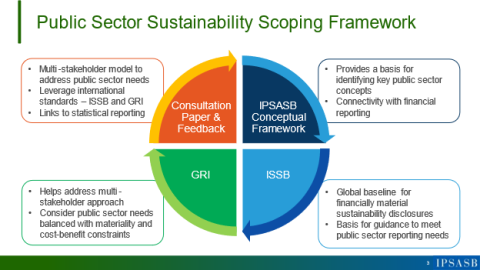
Maria-Rosa Aldea Busquets, Deputy Director General of DG Budget at the European Commission said: “The green transition is a top priority for the European Commission, and we are investing in reporting to ensure also transparency and accountability in this domain. However, I have to admit that it is not an easy topic. Sustainability reporting in public sector is facing three particular constraints: it’s a very broad scope; the multitude of actors implementing the public budgets; and finding the right balance while imposing reporting burden on these actors. It is however essential to report on a transparent and reliable way on how much we dedicate to sustainability relevant topics, and what is the impact of this financing.
Image
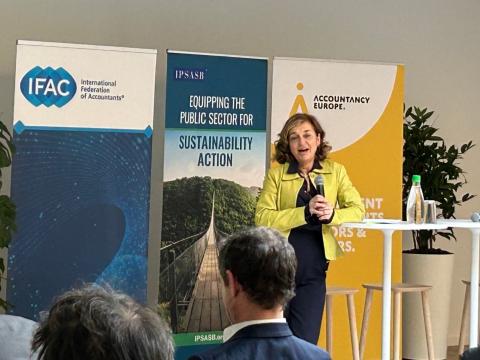
"We are learning by doing and we will continue to build trust, and possibly set an example for other public administrations. This is our commitment towards EU citizens for the European Union budget”, she added.
Image
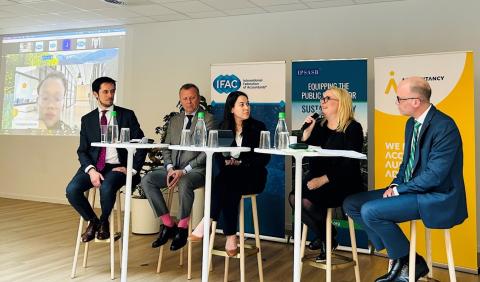
The panel discussion moderated by Laura Leka, Principal and public sector lead at IFAC, featured an impressive line-up of experts:
- Alex Metcalfe, Global Head of Public Sector at ACCA;
- Andrew Blazey, Deputy Head of Division and Lead on Green Budgeting at the OECD;
- Vivi Niemenmaa, Secretary General of INTOSAI WGEA and Deputy Director at the National Audit Office of Finland;
- Lebogang Senne, Technical Director at the Pan African Federation of Accountants (PAFA);
- and Eelco van der Enden, CEO of the Global Reporting Initiative (GRI).
Laura Leka introduced the panel with a call to action. “Public sector specific sustainability reporting standards will undoubtedly strengthen the global response to the climate crisis and other sustainability challenges,” she noted. “IFAC applauds the IPSASB's lead on advancing public sector sustainability reporting and encourages all of our members and stakeholders to get involved however they can”.
The experts in the panel first discussed what should be the focus of public sector sustainability reporting, and reflected on why existing sustainability frameworks and guidance developed for the private sector are insufficient as they are for the public sector. They also debated whether there are any lessons that can be learned to ensure better coordination across different sustainability initiatives; and whether sustainability reporting in the public sector should extend beyond the financial impact on the entity to impacts on society.
Experts also addressed the question of how sustainability reporting is understood at the public sector level and market activity. They discussed why there has not been more demand from capital markets for public sector sustainability information.
The speakers then explored the particularities of public sector sustainability reporting and what would be needed to facilitate its adoption. They debated in particular how to incentivize public sector entities to prioritize reporting on sustainability information, and how to manage public sector reporting’s constraint of capacity and resources, both in developed and developing economies.
Finally, speakers were also asked to share their views on what success would look like to them. For some, success is standards which are fit for purpose, enabling governments to follow them in an effective manner, contributing to strengthen the quality of institutions and their accountability, and to deliver decision-useful information that produces change. Some others insisted that the standards should really resonate with their users, whether in developed or developing countries.
It was also argued that before “jumping to the standards”, agreement on the commodity is needed. The goal should be a clear and simple public sector orientation framework, flexible enough to allow for national specificities, scalable and proportional, that enables differential reporting, but which at the same time is able to drive better behaviors of the public sector, and ultimately influence the private sector approach going forward.
Echoing Olivier Boutellis - Taft’s reference to the latest IPCCC report, which clearly states that “there is a rapidly closing window of opportunity to secure a liveable and sustainable future for all” - , some acknowledged the need to act with urgency, and to aim for globally connected standards – a global baseline – in order to address global challenges and impacts.
Speakers also reminded the pragmatic and real challenges around capacity, but all agreed that we should not “let good be the enemy of the great”, and the call for “getting this started and moving” was unanimous.
Image
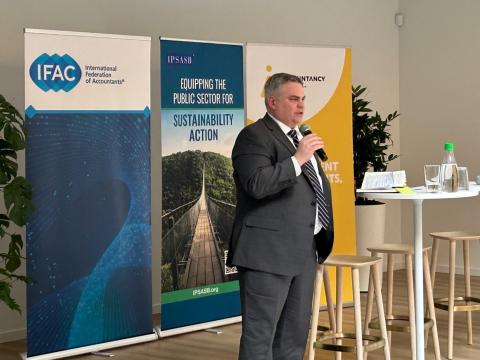
Ross Smith, Programme and Technical Director of IPSASB shared IPSASB take-aways and emphasized the public sector’s importance in driving action on sustainability issues. “Public sector-specific sustainability reporting guidance would encourage transparency, allow governments to be held accountable for the long-term impacts of their interventions, and enable better-informed decision-making.” He reminded attendees that a holistic approach to sustainability reporting is necessary, and the public sector is needed to make that approach a reality.
Following Smith’s comments, Ian Carruthers also touched on the importance of sustainability for the public sector in his conclusion. “The urgency of advancing public sector sustainability reporting cannot be overstated. While the IPSASB is pleased to be playing a leading role in developing the thinking on this initiative, the involvement of the global community will be crucial to equipping the public sector with the tools it needs to address climate change and other sustainability challenges. We look forward to working together over the coming months.”
This is only the beginning of a critical undertaking to equip the public sector for sustainability action.
For a deeper dive into the discussions and hear the responses from our experts on the debated questions, take a look at the full recording of the event and recommendations from the speakers.
Resources are needed to support the IPSASB’s program of activity and stakeholder engagement, and to begin guidance development. To contribute financial or other support to the IPSASB for the development of global public sector specific sustainability reporting guidance, please email Ross Smith, IPSASB Program and Technical Director (rosssmith@ipsasb.org) or James Gunn, Managing Director, Professional Standards (jamesgunn@profstds.org).
Image
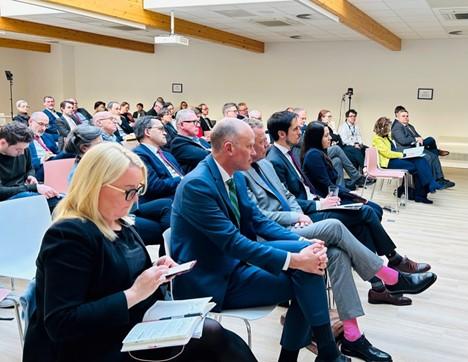
Recommended Resources
IPSASB
Sustainability Reporting | IPSASB
The following guidance has been issued related to climate change and sustainability reporting:
Consultation Paper, Natural Resources
RPG 1—REPORTING ON THE LONG-TERM SUSTAINABILITY OF AN ENTITY’S FINANCES
RPG 3—REPORTING SERVICE PERFORMANCE INFORMATION
CLIMATE CHANGE: RELEVANT IPSASB GUIDANCE
INTOSAI/National Audit Office of Finland
Tools for analyzing policy coherence - National Audit Office of Finland (vtv.fi)
Making sure the money for climate action in MENA is being spent efficiently (worldbank.org)
ACCA
Policy brief on Public Sector Sustainability Reporting (launched at the Brussels event): https://www.accaglobal.com/gb/en/technical-activities/technical-resources-search/2023/april/sustainability-reporting-public-sector.html
The Green Budgeting toolkit: https://www.accaglobal.com/us/en/professional-insights/global-profession/Green-budgeting-a-toolkit-for-public-sector-finance-professionals.html
Green Finance Skills: https://www.accaglobal.com/us/en/professional-insights/global-profession/green-finance-skills-the-guide.html
Sustainability assurance – rising to the challenge: https://www.accaglobal.com/us/en/professional-insights/global-profession/sustainability-assurance-rising-to-challenge.html
GRI
The GRI Perspective: Auditing to save the planet - https://www.globalreporting.org/media/bzfa4jqg/gri_perspective_09_auditors.pdf
A short introduction to the GRI Standards - https://www.globalreporting.org/media/wtaf14tw/a-short-introduction-to-the-gri-standards.pdf
The GRI Standards: A guide for policymakers - https://www.globalreporting.org/media/nmmnwfsm/gri-policymakers-guide.pdf
OECD
Paris Collaborative on Green Budgeting - OECD
Green budgeting: A way forward | OECD Journal on Budgeting | OECD iLibrary (oecd-ilibrary.org)
Accountancy Europe
IPSASB's consultation on advancing public sector sustainability reporting - Accountancy Europe

